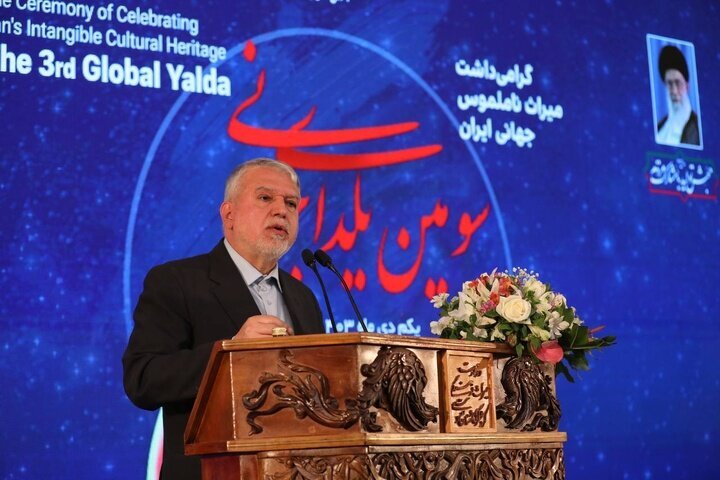Iran celebrates 3rd anniversary of Yalda Night’s UNESCO designation

TEHRAN- A ceremony commemorating the third anniversary of Yalda Night's listing on UNESCO's Intangible Cultural Heritage list was attended by Iranian Minister of Cultural Heritage, Tourism, and Handicrafts, Seyyed Reza Salehi-Amiri, along with a number of cultural heritage officials and foreign ambassadors in Tehran on Saturday.
During the ceremony, Salehi-Amiri congratulated attendees on Yalda Night and the birthday of Hazrat Fatemeh Zahra (SA), Mehr reported.
"Tonight, we have gathered to celebrate one of our primary cultural elements, Yalda Night. We honor both Yalda Night and the birth anniversary of Hazrat Fatemeh Zahra (SA)this evening.”
“The duality of Iranian identity and Islam coexists in Iran, demonstrating that Iranians live with a rational approach where there is no distinction between their Iranian identity and Islam, celebrating cultural elements such as Yalda and Chaharshanbeh-Suri alongside religious occasions like Ashura and Tasua," he added.
He also emphasized on Iranian identity and culture that are tied to the strength and vitality of Iran. “Iran remains a constant in our lineage and history.”
The minister continued, “Iran's cultural richness acts as a magnet attracting the world. Its legacy places it among the top ten countries worldwide historically and culturally. We have identified one million artifacts and registered over 40,000."
"Another crucial element is the Persian language, which embodies the shared spirit of all Iranians around the globe. The persistence of the Persian language over a millennium signifies a continuous cultural legacy, a key to the endurance of this land," he added.
The minister emphasized the importance of cultural diversity in Iran, stating, "Throughout history, no event has caused Iran to break apart. People of Azarbaijan have lived in Iran for thousands of years as beloved people. The Kurds, with their rich cultural heritage, also span thousands of years in this land. The people of Sistan and Baluchestan boast over 5,000 years of history, known for their bravery and resilience. In this geography, we also have Arabs who lived in Iran before Islam, deeply connected to the land. The Turkmen, too, are noble people, and this community is not artificial; they have long been a part of Iran. This cultural diversity has established Iran as a land of plurality and unity."
He concluded by stating that the Iranian intellect has always been renowned throughout history, with ethics being a superior trait of Iranians.
For his part, deputy minister for cultural heritage Ali Darabi stated that honoring Yalda Night highlights how the customs and rituals belonging to the nation’s ancestors have persisted through time, becoming part of Iran’s intangible heritage.
Yalda Night has been cherished among Iranians from ancient times to the present day, he mentioned. Darabi expressed pride for Iranians in having this festival recognized globally.
"The global recognition of Yalda Night signifies its international potential.”
Speaking at the ceremony, the Kyrgyzstan's Ambassador in Tehran Tordogan Sedigov congratulated attendees on Yalda Night, emphasizing that it is part of the intangible cultural heritage of humanity.
"Yalda is an ancient tradition among Iranians and several other countries, symbolizing Iran's respect for nature, family, and culture. Yalda is also celebrated in Kyrgyzstan."
He added, "Let us first congratulate Iranians on Yalda, as they have been celebrating it for thousands of years, since ancient times. Through this celebration, the people of Iran honor their past and cherished traditions. Yalda signifies the victory of light over darkness, which holds great significance."
In 2022, UNESCO added Yalda Night to its Representative List of the Intangible Cultural Heritage of Humanity, highlighting its significance as a cornerstone of Persian culture and tradition.
Yalda refers to a traditional celebration of the sun and the warmth of life. Practiced in Iran and Afghanistan, the event takes place the last night of autumn, when families gather at the houses of elders and sit around a table adorned with a series of symbolic objects and foods: a lamp to symbolize light, water to represent cleanliness, and red fruits such as pomegranates, watermelons, beetroots, jujube, and grapes to symbolize warmth.
Broth, sweets, dried fruits, and nuts that are used specifically for the occasion are also set on the table and consumed during the gathering. Activities range from reciting poetry and storytelling to playing games and music and giving gifts to new in-laws, brides, and children. The event celebrates cultural identity, nature, respect for women, friendship, hospitality, cultural diversity, and peaceful coexistence.
SAB/
